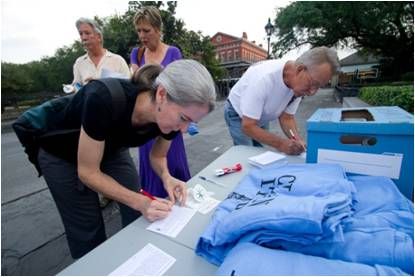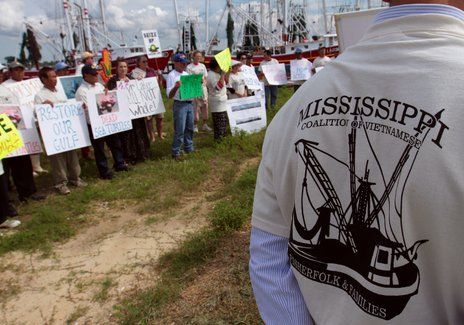RESTORE Act Signed into Law — Now What?
If you've spent any time following recovery efforts from the BP oil disaster of 2010, or broader Gulf Coast restoration issues, you're bound to have heard of the RESTORE Act. The driving force behind the legislation was to direct 80 percent of Clean Water Act (CWA) fines BP is expected to pay to the five Gulf Coast states, rather than having all the money sent to the U.S. Treasury, which the CWA directs. Since CWA penalties are assessed per barrel of oil spilled and whether or not BP is found to be grossly negligent for its actions leading up to the rig explosion, the total fines could range from $5-21 billion.

Over two years after the BP oil disaster began, many Gulf Coast residents continue taking action to hold BP accountable in cleaning up the Gulf.
Last summer as language of the bill was introduced in Congress, Sierra Club staff and volunteer leaders ascertained that while the bill was a step in the right direction to redirect fines back to the Gulf from the federal Treasury, our support of the legislation was trumped by concerns about the need for safeguards to provide accountability, create tools to engage the public, and support independent science. While many environmental and community groups supported RESTORE and worked to secure its passage, the Sierra Club worked constructively to strengthen the bill to ensure our concerns were addressed.
This past spring a congressional conference committee began working to reconcile the House and Senate versions of RESTORE, the final version of which was passed by Congress on June 29 as a part of a larger compromise Transportation bill. Nearly the entire Gulf Coast delegation voted for it, and President Obama signed it into law on July 6. While a full evaluation of the bill's final language is now underway, it's evident that RESTORE lacks important measures to address some of the Sierra Club's concerns such as a Regional Citizens' Advisory Council. The Council, for example, would be made up of local resident and community leaders to oversee industry activities and to ensure regulators were properly enforcing laws to help avoid future disasters.

A Gulf Coast Regional Citizens' Advisory Council should include Vietnamese fishermen like these from Biloxi, MS, who are still struggling to recover from the disaster.
What's more, the monies coming to the Gulf Coast will be controlled by Gulf state's governors (all five are Republican), state and federal agencies, and other elected leaders, Gulf residents will have little say in how or where the billions of dollars will be spent. Limited public input and oversight is even more disturbing given that RESTORE directs monies for environmental and economic development projects. Though some of these dollars may be put toward addressing the region's systemic environmental issues like coastal erosion or the Dead Zone, we have real concerns about the opportunity for monies to be misspent or redirected to projects that have little redeeming value for restoring our ecosystems, families, fisheries, and communities across the Gulf Coast.
The Sierra Club will continue to remain vigilant in the weeks, months, and years ahead to ensure the monies from this bill and other BP oil disaster recovery efforts, like the Natural Resource Damage Assessment process, are used in a meaningful way to support a healthy, sustainable, and vibrant region all Gulf citizens deserve.
—Jill Mastrototaro, Sierra Club's Gulf Coast Campaign Director